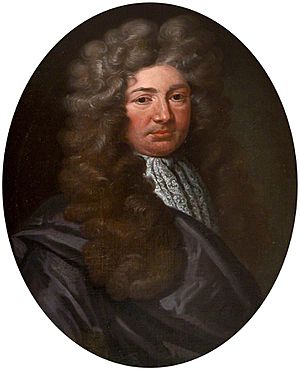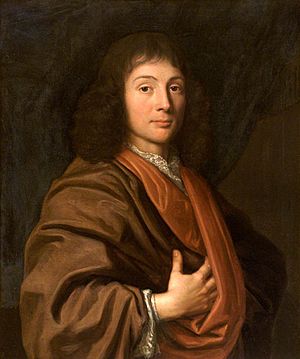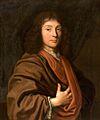Sir Henry Parker, 2nd Baronet facts for kids
Sir Henry Parker, 2nd Baronet (born 25 July 1638 – died 25 October 1713) was an important English politician. He lived at Honington in Warwickshire. Sir Henry was a Member of Parliament (MP) for Evesham several times. He also represented Aylesbury for a short period. Being an MP meant he helped make laws for England.
Contents
Early Life and Career
Henry Parker was born on 25 July 1638. He was the oldest son of Henry Parker and Margaret White. His father was a painter-stainer, which was a type of artist. Henry went to Merchant Taylors' School starting in 1650.
In 1658, he began studying at Inner Temple to become a lawyer. By 1660, he became a clerk of assize for the Oxford area. This job involved helping judges in court.
By 1663, Henry was doing well enough to buy land. He bought property in Talton, Worcestershire, and Honington, Warwickshire. At Honington, he started rebuilding a large manor house.
In 1665, he married Mary Hyde. Her father was Alexander Hyde, the Bishop of Salisbury. Henry and Mary had ten children together, five sons and five daughters. Henry became a full lawyer in 1666. When his father passed away in 1670, Henry inherited his family's estates.
In 1672, Henry became a recorder (a type of judge) in Evesham. He left his clerk of assize job in 1674.
Henry Parker's Time in Parliament
Henry Parker was first chosen as a Member for Evesham in March 1679. He served in a special Parliament that discussed important laws. He was an MP until January 1681.
He was elected again in 1685 to serve under King James II. Then, in 1689, he was chosen for the Convention Parliament. This Parliament was very important because it decided who would be the next king and queen.
In 1690, Henry tried to be re-elected for Evesham but was not successful. He decided to step out of the race before the final votes.
Working Outside Parliament
When he wasn't in Parliament, Henry Parker was still busy. He worked as a Justice of the Peace in Worcestershire and Warwickshire. This meant he helped keep law and order in those areas. He was also a deputy lieutenant, helping with local defense.
Through his wife, Henry was related to Edward Hyde, 3rd Earl of Clarendon. In 1691, he visited Clarendon, who was in prison for supporting Anne. Henry also worked as a temporary manager for George Compton, 4th Earl of Northampton. He might have also continued his work as a lawyer during this time.
Return to Parliament
In 1695, Henry Parker was in a much stronger position to win the election in Evesham. Even though people could vote for two candidates, many of Henry's supporters voted only for him. This helped him win against his opponent, Sir Rushout Cullen.
Henry was not a very active MP at this time. He voted only sometimes. In 1696, he chose not to sign the Association of 1696. This was a document where people promised to support King William III.
In March 1697, his uncle, Sir Hugh Parker, 1st Baronet, passed away. Henry inherited his uncle's title, becoming the 2nd Baronet, and also a lot of his land.
When Parliament met again in 1698, Henry worked on a committee. This group looked into problems for glass makers in Worcestershire. He also investigated tax complaints in the Broadway area.
Later Political Influence
Henry's work on local issues made him popular with the people he represented. He was re-elected for Evesham later in 1698. He was known as a "Country" supporter, meaning he often supported local interests over the King's government.
In 1701, Henry decided not to run for re-election. He wanted to focus on local matters. He became a deputy lieutenant for Warwickshire again. In 1703, he took on this role once more.
Henry helped his son, Hugh, win the Evesham seat in Parliament in 1701. This meant Henry could no longer represent Evesham himself. Instead, he relied on his son-in-law, Sir John Pakington, 4th Baronet.
In 1704, an MP for Aylesbury (UK Parliament constituency), a seat controlled by Pakington, died. A special election, called a by election, was held. Pakington supported Henry Parker, and Henry was elected on 24 November. He voted to support a bill about religious freedom a few days later.
This was Henry Parker's last time as an MP. He chose not to run in the 1705 general election. However, he still had a say in local politics. He supported other candidates, including his son-in-law, Sir Thomas Cookes Winford, 2nd Baronet. It was thought that he could influence between 60 and 80 votes in elections.
In his retirement, Henry bought more land, including the manor of Tredington. He also spent time at his house in London. Sir Henry Parker passed away on 25 October 1713 and was buried at Honington Church.
Images for kids
 | Victor J. Glover |
 | Yvonne Cagle |
 | Jeanette Epps |
 | Bernard A. Harris Jr. |




